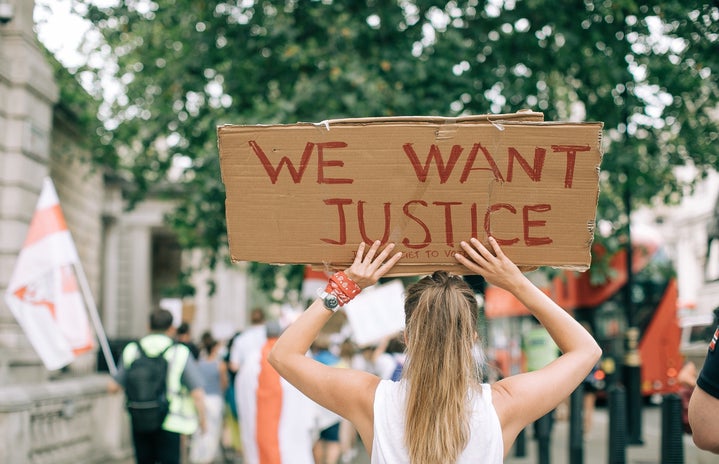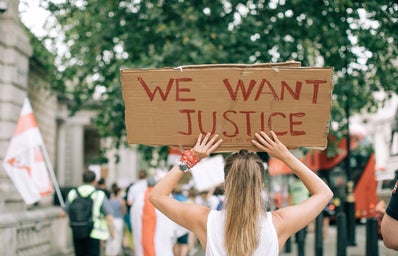By: Adriana Fiorante
In feminist circles, the common statistic around sexual assault is that out of 1000 sexual assailants, 995 will walk.
According to the Rape, Abuse & Incest National Network, an American anti-sexual violence organization, 230 of 1000 sexual assaults are reported to the police. 46 of these reports will lead to an arrest. Nine of these arrests will be referred to a prosecutor and not 4.6 of the 9 will end up in jail. 995 out of 1000 assailants are free.
I always focus on the perpetrators, I think everyone would, the statistic is about the perpetrators. I would get angry that 99.5 per cent of men who sexually hurt women get to walk around and get ice cream or burgers like I get ice cream and burgers, as if there isn’t a substantial difference in our morals and how safe it is to be around us. I would grow angry thinking that it’s not fair that this person does not have to rehabilitate and grow respect for others bodies and lives in an environment where they’re monitored or away from people they could hurt.
It dawned on me recently that if 995 sexual assailants walk, it means 995 victims of sexual assault do not find closure or justice. They do not find comfort in a system that helps them and takes their side, they do not find safety in their social circles, they are often not believed.
50 per cent of victims do not report to the police because they didn’t feel it was important. Out of victims who didn’t report to the police, 33 per cent didn’t report because they believed the police couldn’t help. 18 per cent didn’t report because they believed the police wouldn’t help them. 50 per cent didn’t report because they believed it was a private matter and 14 per cent wanted to avoid publicity from the instance, according to Canada’s Department of Justice.
A Globe and Mail investigation into handling of sexual assault cases found that 20 per cent of sexual assault reports are thrown away, considered baseless, the women not believed.
It’s uncomfortable and embarrassing to put in black and white and perhaps put a question mark on my word, but I was one of the women who was not believed. I dated someone for two years and about six months into the relationship, I told him that I had been sexually assaulted.
He explicitly stated that did not believe me, accused me of cheating and repeatedly insisted that if I did not want it then I would have done something. I didn’t call the police immediately, so I am lying. I didn’t tell my family, so I am lying. I didn’t try to beat him up, so I am lying. I didn’t leave the room after, so I am lying. He continually insisted that he was more hurt by me not saying I was sexually assaulted than I could have been hurt by being assaulted. Everything that I did not do or did do was something that was treated like a signed confession that I had wanted to be hurt, disrespected, assaulted.
In order to prove to my boyfriend that I had not cheated on him and it was sexual assault, he demanded I go to the police. I was extremely resistant: I didn’t want my parents to know I was assaulted, I didn’t want to have to pay for a lawyer, I was humiliated by the experience and someone close to me not believing me just assured me that the police wouldn’t either. I was well-versed in police mistreating sexual assault cases and didn’t want to waste my time. I just wanted to be understood that I was hurt and move on.
I sat at the police station alone, overhearing cops in street uniforms loudly complain in the front office that they had to go down to Davisville Station at five in the morning because “some asshole jumped the tracks in front of a subway.”
I was blessed to be questioned by a female detective and when I was leaving, she gave me a pamphlet to a sexual abuse survivor hotline. She told me that if I never wanted to go further than reporting, that was fine, and many women don’t wish to pursue it further and find closure in just reporting the assault. She told me there was no statute of limitations and if in 10 years I wanted to pursue it, I could then.
Throughout speaking about the instance, I kept looking at her and thinking “is what I’m saying convincing enough? Does it make sense? Does she believe me?”
I had reported it to the wrong station, and it was transferred to another detective, a man. I called him but he was on vacation for a month, so I had to wait to talk to him. When he reached out back to me, I was in the heat of mid-terms and was extremely nervous to talk to someone new about it, especially a man, and didn’t respond. A few days later he emailed me saying that if I didn’t respond he was throwing the file out, and that I couldn’t pursue it in the future unless I responded then and there.
I’m being cajoled
He’s lying to me, he’s trying to force me into talking when I’m not ready to
He’s not sympathetic to me at all
He does not believe me – this I said to myself as a half joke, a flop, of course a police officer would not believe me. It still felt terrible and irritating, there was a voice of pride in my head wanting him to validate me and recognize that he doesn’t have my eyeballs, he doesn’t know my experiences, I wouldn’t lie about assault.
There is a complete loneliness to not having people recognize or believe your basic experiences. There is a total emptiness to saying I see the sky as blue and people telling you that you’re wrong, your experiences are not true. There’s nothing you can rebuttal someone who does not believe you, you just have to sit there and accept that they do not think your experiences are there. There is a massive feeling of disconnect in these moments, humans, I think, are empathetic. When we hear someone say “I crossed the street” we picture it with them. To tell someone an honest experience and have them remove this moment of empathy is to create loneliness, the hand you reached out to hold was jerked back.
In class, we were shown a video of a woman on mock-trial for sexual assault being cross-examined. In it, a lawyer barks at an assaulted woman, openly not believing she was assaulted for the sake of his hypothetical client. What she was wearing, her relationship with the rapist, if she was drinking, where she slept that night, how much she touched him, everything was brought into questioning. Everything she said was twisted into proving that she was lying. She curled up in her seat and looked at the lawyer for mercy. What was more important was his client’s freedom.
My throat closed up watching it, my boyfriend had barked at me like the lawyer had barked at her. I had looked at my boyfriend for mercy as well, what was more important was his hurt over being “fooled.”
Twenty per cent of assaulted women had someone somewhere look down their nose at them and question their claims to legitimacy in a similar way, the police, their friends, their family, their community, their boyfriend.
A desperation came in me to prove that I was not lying, it seeped into my subconscious and formed an anxiety – how often do people think I’m lying about other things? How often do I tell people about my childhood and they think I’m lying? How often do I have to prove that I actually do know how to ride a bike? If those closest to me do not believe me, the institution does not believe me, and society does not believe me, then what experience do I have to share? My conscious experiences are paper thin, I may as well not exist.
The women who were barked at on trial, whose cases were thrown out by police, whose communities turned their back on and said they ruined a guy’s life, whose societies said she wanted it to happen, have their experiences de-empathized and removed from public acceptance. If you tell someone you went to Cabo on winter break, and they respond, “no you didn’t, I don’t believe you.” And you show them pictures of it and they still don’t believe you, what do you have left? You are alone.
I think about the women in Alabama, New Mexico, Guatemala, Brazil, Portugal, Ireland, Switzerland, Latvia, Ukraine, Mongolia, Thailand, Laos, India, Afghanistan, Iraq, Syria, Palestine, Algeria, Mali, Sierra Leone, Chad, Cameroon, Angola, Botswana, Zimbabwe, Fiji, Papua New Guinea, Cuba, Haiti, everywhere, who were assaulted like myself. I wonder if the people around her comforted her rather than tried to defend the character of a rapist. I hope the people around her did not give her the same loneliness and the same self-questioning that I and 20 per cent of Canadian women assaulted are given.
I wonder if they feel the worry of having to convince someone the sky is blue where they are, too.



